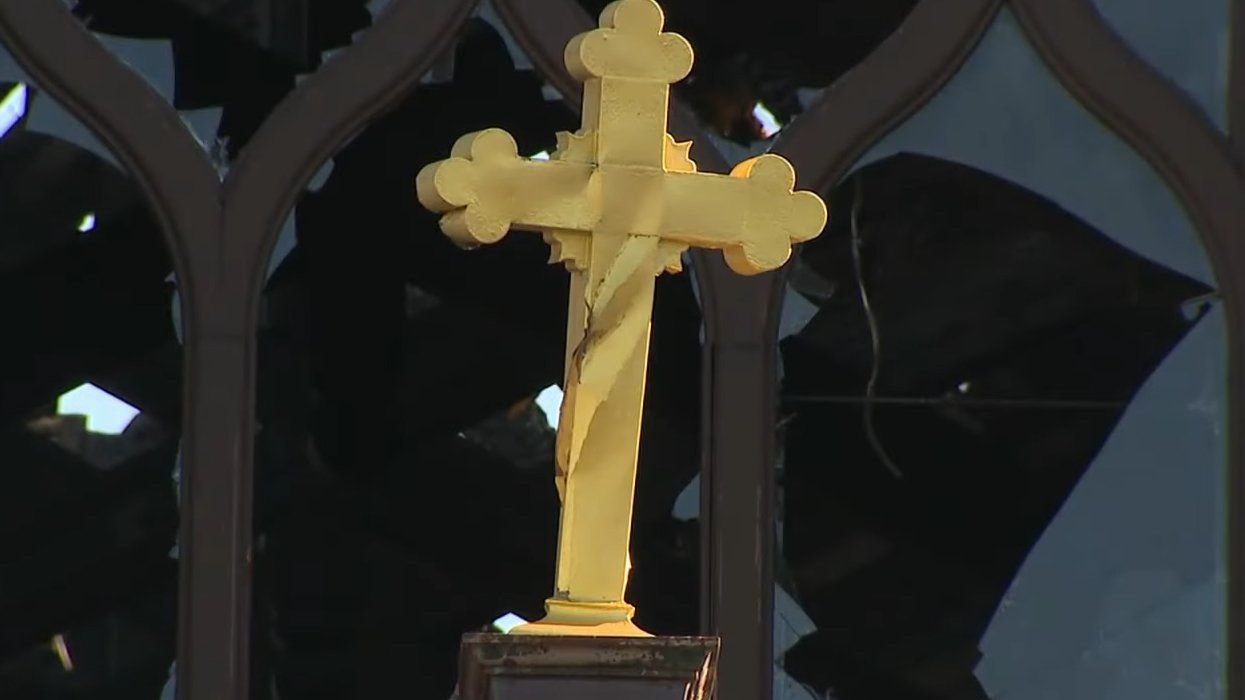Report: Attacks on churches have skyrocketed in recent years — and the trend is accelerating

Attacks on churches in the U.S. have skyrocketed in recent years, and the trend appears to be fast accelerating, according to a new report from the Family Research Council.
The report, authored by Arielle Del Turco, director of the Center for Religious Liberty at the FRC, noted that between 2018 and 2023, there were at least 915 acts of hostility against American churches. These depraved actions have ranged from vandalism and arson to gun-related incidents and bomb threats.
The states that reportedly accounted for the greatest number of church-related hostilities in the six-year period were California, with 91 incidents; Texas, with 62 incidents; New York, with 58 incidents; and Florida, with 47.
Things appear to be getting much worse.
Between January and November 2023, there were reportedly at least 436 such attacks — eight times as many as there were in 2018 — such that 2023 ended up being the worst of all six years reviewed by the FRC.
The FRC observed 315 incidents of vandalism last year; 75 arson attacks or attempts; 10 gun-related occurrences; and 20 bomb threats.
Among the various documented instances of vandalism in 2023 was the January 2023 smashing of stained glass windows at Holy Nation Church of Memphis, Tennessee; the June shredding of Bibles and hymnals at the historically black Fowler United Methodist Church of Annapolis, Maryland; and the July inversion of crosses at Most Holy Trinity Catholic Church in El Paso, Texas, which was also slapped with satanic imagery.
In terms of arson, attacks ranged from small to massively destructive fires. The Easter Sunday fire set to Faith Lutheran Church in Cambridge, Massachusetts, for example, resulted in substantial damage as well the removal of the church's steeple.
Del Turco noted that "although the motivations for many of these acts of hostility remain unknown, the effect is unmistakable: religious intimidation."
The beheading of a statue of religious significance may, for example, leave congregants "disturbed and upset." Other acts of hostility may alternatively "cause congregants or church leaders to feel unsafe," thereby interrupting the normal work of the church, according the report.
"They send the message that churches are not wanted in the community or respected in general. Our culture is demonstrating a growing disdain for Christianity and core Christian beliefs, and acts of hostility against churches could be a physical manifestation of that," continued Turco. "Regardless of the motivations of these crimes, everyone should treat churches and all houses of worship with respect and affirm the importance of religious freedom for all Americans."
The report posits that the increase in hostility against churches may point to a "larger societal problem of marginalizing core Christian beliefs, including those that touch on hot-button political issues related to human dignity and sexuality."
While frequently targets for radicals on account of their congregants' fidelity to tradition, churches also appear to be a reflexive scapegoat for leftists and other extremists.
Radicals in the U.S. seized upon the 2020 death of George Floyd as an excuse to lash out at their perceived foes, which turned out in many cases to be Christians and their places of worship. Leftists did likewise in 2022 in the lead-up to and wake of the Supreme Court's Dobbs decision, attacking churches and pro-life pregnancy centers alike.
This reflex appears elsewhere in the West. For instance, in Canada, at least 68 churches were razed, desecrated, or vandalized in 2021 after activists, the northern nation's liberal media, and political elites hyped the mass graves hoax.
The hoax, fully embraced by the Trudeau regime, alleged that mass graves had been discovered at the sites of former Indian residential schools that had been administered by Christian groups. The claims, which were dubious to begin with, were subsequently debunked, but not before radicals torched Catholic and Anglican churches across the country.
Tony Perkins, president of the FRC and a former chair of the U.S. Commission on International Religious Freedom, said of the findings in the report, "There is a common connection between the growing religious persecution abroad and the rapidly increasing hostility toward churches here at home: our government's policies."
"The indifference abroad to the fundamental freedom of religion is rivaled only by the increasing antagonism toward the moral absolutes taught by Bible-believing churches here in the U.S.," continued Perkins, "which is fomenting this environment of hostility toward churches."
Like Blaze News? Bypass the censors, sign up for our newsletters, and get stories like this direct to your inbox. Sign up here!
Source link

